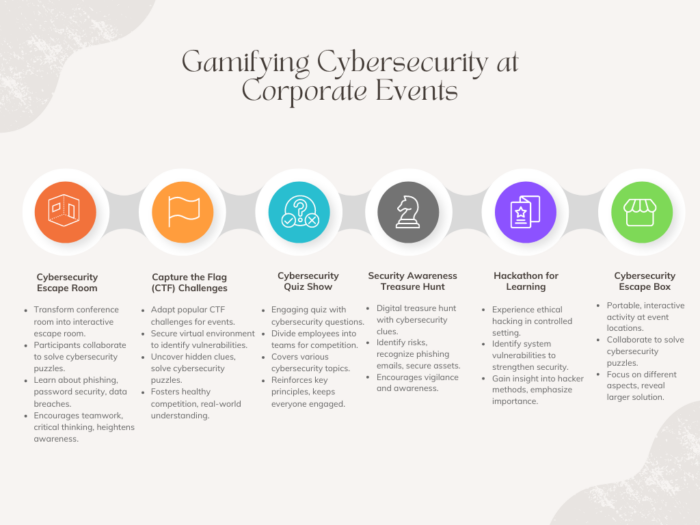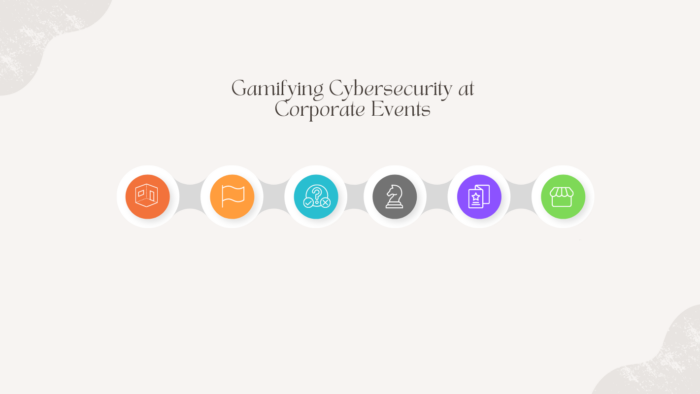In the fast-evolving digital landscape, cybersecurity is of paramount importance for organizations to protect their sensitive data and information. It is challenging to engage employees and cultivate a cyber-aware culture. To tackle this, gamification offers an exciting and effective solution. By introducing engaging cybersecurity activities during corporate events, organizations can make learning fun and instill essential knowledge among their employees.
A recent cybersecurity resilience study conducted by Accenture revealed that 82% of respondents reported a budget increase to strengthen their systems and train their employees. According to Allianz’s barometer on global business risks, the need for enhanced cybersecurity is evident as cyber incidents have been ranked as the top business risk, surpassing business interruption, natural catastrophes, and even pandemic outbreaks. In this article, we explore the role of gamification in cybersecurity, the activities that can be performed to raise awareness, and the advantages of organizing such events.
The Role of Gamification in Cybersecurity Awareness
To foster effective cybersecurity training, it’s essential to go beyond merely providing information and instead focus on changing behaviors. Gamification emerges as a powerful solution to achieve both knowledge development and behavior change. Utilizing serious games, such as digital Escape Rooms, virtual Treasure Hunts, or digital investigations, can engage employees and create a lasting impact.
Now let’s take a look at what are the activities that can be played for awareness of cybersecurity:

Cybersecurity Escape Room
A Cybersecurity Escape Room turns education into an exciting race against the clock. Here’s how you can implement it:
- Transform a conference room into an escape room setting, which involves cybersecurity-related clues and puzzles.
- Divide employees into teams and explain the rules of the game.
- As the game begins, the teams need to solve puzzles that are designed around cybersecurity threats, such as identifying phishing emails or creating a strong password.
- The team that solves all the puzzles and “escapes” the room first wins.
Capture the Flag (CTF) Challenges
CTF challenges provide a hands-on learning experience in identifying and exploiting system vulnerabilities. Here’s how to set up a CTF game:
- Create a secure virtual environment populated with “flags” (i.e., digital tokens) that are hidden or protected.
- Teams or individuals must then identify and exploit vulnerabilities in this environment to capture these flags.
- The participant or team that captures the most flags within a given time limit wins.
Cybersecurity Quiz Show
A cybersecurity quiz show can test and reinforce employees’ knowledge in a fun, competitive format. To host one:
- Divide employees into teams and set up a quiz show stage.
- The quiz host will ask questions related to cybersecurity. Questions can range from basic awareness to advanced security concepts.
- Teams buzz in to answer. Correct answers earn points, and incorrect answers may lose points, depending on your rules.
- The team with the highest score at the end wins.
Security Awareness Treasure Hunt
This game brings the thrill of a treasure hunt to cybersecurity awareness. To organize a Security Awareness Treasure Hunt:
- Develop a series of clues or challenges related to cybersecurity and scatter them throughout the workplace.
- Employees or teams follow these clues, which will involve tasks like identifying security risks or recognizing phishing emails.
- The individual or team that completes all the challenges first wins.
Hackathon for Learning
A hackathon allows employees to learn about system vulnerabilities in a controlled environment. To conduct a Hackathon for Learning:
- Set up a controlled environment with pre-determined vulnerabilities.
- Participants try to find and exploit these vulnerabilities, effectively simulating the actions of a hacker but in a safe and controlled way.
- Reward participants for finding vulnerabilities, perhaps with extra points for those that are particularly hard to find or exploit.
- At the end, review the vulnerabilities found and discuss the solutions.
Cybersecurity Escape Box
A Cybersecurity Escape Box offers an engaging hands-on learning experience. Here’s how you can set it up:
- Set up a box with various locks and hidden compartments.
- Each lock can be opened by solving a puzzle or challenge related to a cybersecurity concept.
- Employees work together to solve these puzzles and unlock the compartments.
- The first team to unlock all compartments and “escape” the box wins.
Advantages of Gamification for Cybersecurity Awareness
The combination of immersion and fun in gamification makes the awareness-raising action memorable and effective. Participants are placed in realistic scenarios where they can make decisions, learn from their mistakes, and experience the consequences in a safe environment, ensuring no negative impact on the organization.
For employees, gamification offers the opportunity to:
- Understand risky behaviors, both individual and collective, practically and enjoyably.
- Become aware of cyber dangers existing at all organizational levels through hands-on experience.
- Develop vigilance and familiarity with implemented cybersecurity procedures.
Moreover, for organizations, gamification serves as a means to:
- Spark discussions about cybersecurity among employees, fostering an open dialogue.
- Assess employees’ knowledge on the topic and identify areas that require further attention.
- Encourage a culture of learning from mistakes in a safe setting.
- Improve team collaboration and cohesion.
- Strengthen communication between the IT team and other employees.
Gamification’s fun and engaging nature capture employees’ attention throughout the awareness-raising process. It appeals to cognitive and emotional drivers, reducing the stress associated with cybersecurity threats. During the game, a scoring system, rankings, rewards, and avatars stimulate intrinsic and extrinsic motivation, keeping participants fully engaged. After the gamified cybersecurity training session, the positive memory of the experience lingers, enhancing the long-term retention of cybersecurity knowledge.
In addition to engaging in cybersecurity games and activities, another vital aspect of corporate cybersecurity awareness is understanding the importance of a secure connection, especially when using public Wi-Fi or accessing sensitive company data remotely. Virtual Private Networks (VPNs) are an essential tool for ensuring privacy and security online.
One such top-rated VPN service is Surfshark VPN, as it offers robust encryption, a wide range of server locations, and a strong commitment to privacy. It can be used as part of cybersecurity training to demonstrate how a secure connection works and why it’s vital in protecting sensitive information.
Conclusion
Cybersecurity is just as crucial as security measures like office building security systems, and gamifying cybersecurity during corporate events presents a powerful way to engage employees and raise awareness about the importance of cybersecurity best practices. Organizations can create a positive and proactive cybersecurity culture by making learning fun and interactive. Through these engaging activities, employees become active participants in their organization’s cybersecurity efforts, fostering a safer digital environment for all.
Related stories

You’re building a self-guided tour, and you’d like to increase the immersion? The music is one of the important aspects...

With your Loquiz game, you can add a list to simply display your tasks. It’s recommended for indoor games or...

The Loquiz creator allows you to have a map… But also a custom visual interface called “Playground“. This feature allows...
Start free trial to bring your ideas to life
Sign up and create games, tours, team events and educational content that captures peoples' attention
Start from the scratch or use templates to kickstart!
